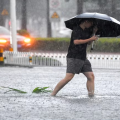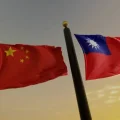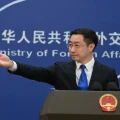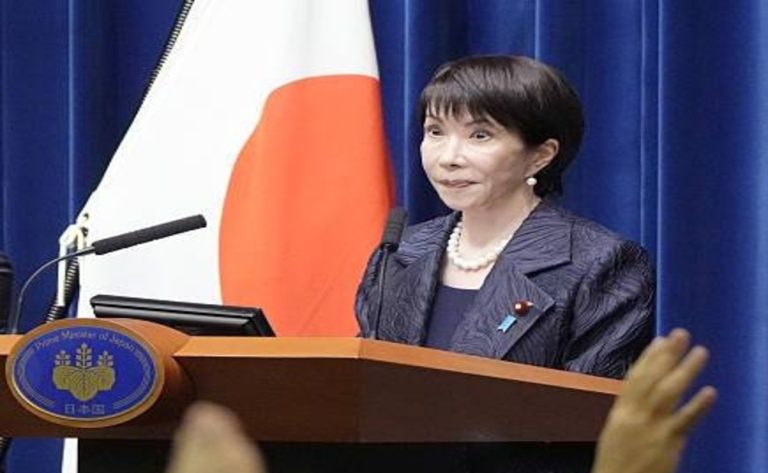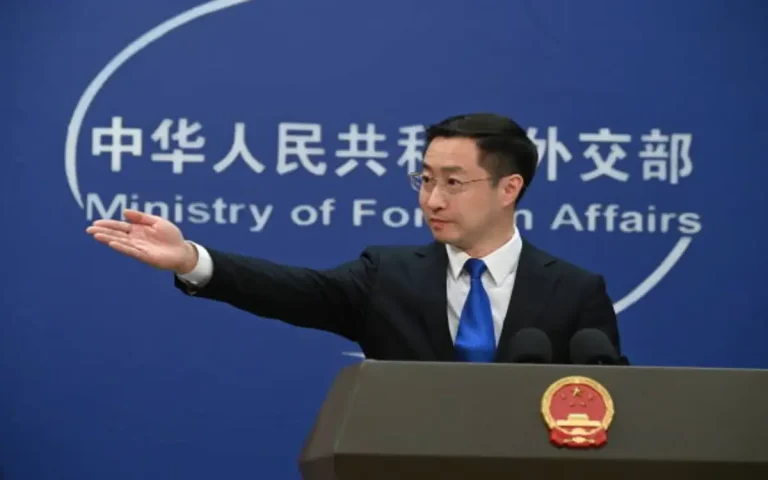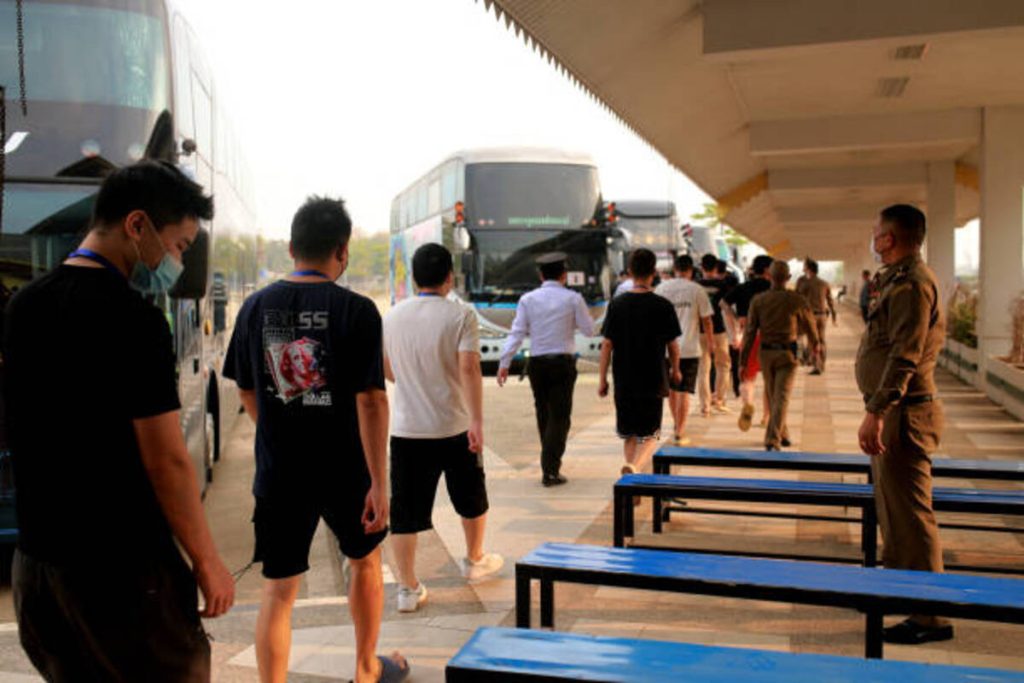
Chinese nationals freed from Myanmar scam centres arrive at the Thailand border in Myawaddy township on February 20, 2025. AFP/STR/Getty Images
MYANMAR, Oct 23 (Epicstorian News) — More than 600 people escaped one of Myanmar’s most notorious scam centres and crossed into Thailand after a military raid on the compound, according to a Thai provincial official.
Myanmar Scam Centre Raid Sparks Mass Border Crossing
The raid targeted a vast criminal hub known as KK Park near the town of Myawaddy, a notorious base along the Myanmar-Thailand border long associated with cybercrime syndicates and human-trafficking operations. (Reuters)
Local authorities in Thailand’s Tak Province said that hundreds of people swam across the Moei River or arrived by boat, seeking protection following the sudden military operation inside Myanmar. (BBC)
Deputy governor Sawanit Suriyakul Na Ayutthaya stated that “677 people fled from the scam centre” and were taken into custody for humanitarian screening.
He confirmed that the arrivals “will undergo screening to determine whether they have been victims of human trafficking or whether they should face prosecution for crossing the border illegally.”
The exodus highlights the continuing instability and lawlessness along the frontier region, where loosely governed enclaves have become safe havens for organised cyber-crime networks.
KK Park and the Growth of Cybercrime Compounds
The compound known as KK Park, spanning hundreds of buildings, has been repeatedly identified by regional security analysts as a major site for online fraud operations targeting victims across Asia and beyond.
Investigations by international media have revealed that thousands of trafficked labourers are coerced into executing “pig-butchering” scams — elaborate online fraud schemes involving fake romantic or investment offers designed to defraud individuals of savings.
Authorities said the operators of these centres often confiscate workers’ passports, confine them within guarded compounds, and subject them to threats or violence if they refuse to comply.
The compound at Myawaddy reportedly installed dozens of Starlink satellite receivers to maintain internet access even during government blackouts.
Security experts have said such technological autonomy allows these criminal networks to continue operations despite repeated crackdowns by local or regional forces.
Thailand Responds to Surge in Border Crossings
Thai security forces, border patrol units, and immigration officials mobilised quickly to process the arrivals, setting up temporary shelters and medical facilities along the Tak Province border zone.
Provincial officials emphasised that the migrants are being handled under humanitarian protocols consistent with international norms, pending the determination of their legal and victim status.
Thailand has faced increasing pressure to address the influx of trafficked workers fleeing Myanmar’s border zones since February, when a government-backed crackdown began repatriating workers found in similar compounds.
According to official figures, over 7,000 people have been repatriated this year in coordination with international agencies and regional law-enforcement partners.
Thai police said they are cooperating with Myanmar authorities to identify the networks behind KK Park and other criminal facilities along the Moei River corridor.
Myanmar Military Operation and Political Backdrop
The Myanmar military, or Tatmadaw, launched the recent raid as part of what it described as a “nationwide effort” to dismantle criminal organisations undermining the country’s security and reputation.
Military-run media reported that over 2,000 individuals were detained during the raid and that several dozen Starlink terminals and computer servers were seized from the site.
Regional observers have noted that the Tatmadaw’s control over Myawaddy and adjacent territories remains fragile due to ongoing clashes with ethnic armed groups, including the Karen National Union (KNU), which denies any link to scam operations.
Analysts say overlapping control by militias, the military, and criminal financiers has allowed the compounds to flourish with minimal oversight or central governance.
The Myanmar junta has previously accused armed ethnic organisations of shielding or taxing scam-centre operations, while the groups accuse the military of tolerating or profiting from them.
Human-Trafficking Dimensions of the Myanmar Scam Centre
Human-rights advocates describe the compounds as a modern form of digital slavery, where workers from China, Thailand, Malaysia, and even as far as Africa are trapped in scam compounds under coercive conditions.
Rescue organisations estimate that tens of thousands of people remain trapped in similar compounds across Southeast Asia, many subjected to beatings, deprivation, and forced online labour.
Thailand’s Ministry of Social Development and Human Security said its officials are conducting interviews with the new arrivals to determine the presence of trafficked victims among them.
Officials also announced plans to increase surveillance along the Moei River and neighbouring Mae Sot district to curb further illegal crossings amid ongoing instability in Myanmar’s border regions.
International Reactions and Ongoing Crackdown
Regional governments, including China, Laos, and Cambodia, have stepped up joint law-enforcement operations targeting transnational scam networks over the past year.
China’s Ministry of Public Security recently confirmed that thousands of its nationals have been rescued from similar scam compounds across Myanmar and northern Laos.
Diplomatic observers believe this latest raid reflects both domestic and international pressure on the Myanmar military to demonstrate control over illegal economic zones.
However, experts caution that as long as corruption, armed conflict, and poverty persist, these scam networks are likely to relocate and re-emerge elsewhere along porous borders.
Reports indicate that while the KK Park raid disrupted major operations, construction of new compounds has continued nearby, supported by syndicates using cryptocurrency payments and encrypted communications.
Thai officials said coordination with ASEAN partners is being strengthened to enhance data-sharing and intelligence tracking of transnational crime syndicates operating across the region.
Authorities also plan to involve United Nations agencies and international NGOs in victim identification, safe repatriation, and rehabilitation programmes for trafficking survivors.
Local authorities in Tak Province confirmed that most of the new arrivals have been relocated to processing facilities where they will remain pending verification of nationality and trafficking status.
Meanwhile, Myanmar’s military announced its intention to continue operations against “illegal compounds” across the border states of Kayin and Shan, promising to prosecute perpetrators under cybercrime and anti-trafficking laws.
